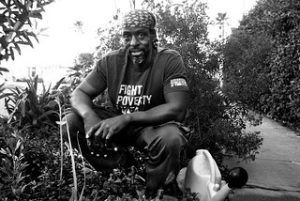Nicholas Stagg- Ron Finley- The Ambition for Healthier Cities
Nicholas Stagg
Nicholas Stagg
Ron Finley- The Ambition for Healthier Cities

Ron Finley, from Meghan Grimes on Flickr
Preface-My name is Nicholas Stagg. The title of this portfolio is “Ron Finley- The Ambition for Healthier Cities”. I will be using a CC0 license for this project.
Whilst living in South Central, newly named South Los Angeles, Ron Finley made observations that this area mostly consisted of “liquor stores, fast food, vacant lots” as stated in his TED Talk named “A guerilla gardener in South Central LA| Ron Finley”. He further states that this area is known as a food desert. As per the source “Healthline”, it states “Food deserts are communities that have poor access to healthy, affordable foods”. This is historically seen in low-income areas, consisting of a majority of African-American and Latino communities, across the United States. To reconstruct his community, Ron Finley decided to plant vegetables on a strip of land in front of his house. This idea first received backlash from the city but was eventually overruled. He states that “gardening is his graffiti” and the soil is his canvas. Growing ever-popular, Ron Finley pioneered a path for positive change amongst impoverished communities as an environmental artist. Overall, his work embellished the ones around him to make a change by rejuvenating the environment and striking back at discriminant inequality.

An example of Urban Gardening created by Ron Finley, from US Embassy New Zealand on Creative Commons
Throughout Ron Finley’s work amongst his community, two notable themes are present. His work attacks the indiscreet inequalities faced throughout inner cities in America by overtly creating solutions with the problem itself. He exemplifies that the problem is food, and the solution is food. With this prejudice faced amongst African American and Latino communities, he burdens this problem with better access to healthier food alternatives by turning “food deserts into food sanctuaries” as stated on his website “The Ron Finley Project”. The second theme present is his attributions toward environmental rejuvenation. As seen throughout Los Angeles is a plethora of unessential, vacant lots amidst this urbanized area. Ron Finley illustrates this idea quantitatively by stating it is equal to “20 Central Parks” and could plant over 700 million tomato plants as per his Ted Talk. Overall, he has helped plant a myriad of community gardens in these unused spaces, not only as a food source but also as a piece of artistry.
The images presented in the text help elucidate Finley’s values to nourish and inform a community to not be complacent with their environment. As presented in the first picture is an evident photo of Ron Finley in front of one of his plentiful amounts of urban gardens. Deconstructing this photo further, it shows him wearing a shirt stating, “Fight Poverty”. As part of his mission to help flourish communities across the globe, he is helping the impoverished by fighting poverty, and to help have sustainable agriculture as well as a bountiful of healthy and nourishing foods instead of the lesser alternative, fast food. Overall helping these solvable problems with a closer proximity to healthier foods. The following two images show Ron Finley’s work amongst his community to create involvement in this project. As stated previously Finley is “teaching individuals how to regenerate their lands into creative business models”. Furthermore, he teaches this idea to children, as seen in the third picture. In his Ted Talk, he says “If kids grow kale, kids eat kale”. He also reaches the younger audience by transforming people’s mindsets into thinking gardening is “hip, cool, innovative” as stated on his website “The Ron Finley Project”. He also appeals to this audience by going by the pseudonym “gangsta gardener”. Overall, he is trying to make the idea of gardening more established and popular to offset the consequences of their “food desert”.

Ron Finley teaching children about his initiatives, by US Embassy New Zealand from Creative Commons
Throughout Ron Finley’s community of South Central Los Angeles, labeled as a food prison, he characterized the area of lacking fresh produce which corresponds with other inner cities throughout America. This ultimately leads to preventable health crises such as obesity, which diversifies greatly with the obesity rate of Beverly Hills, which is a few miles north. The main principle of this problem is the monetary value of these communities. Finley strikes back at this issue by empowering his community to solve this issue themselves by making gardens, therefore resulting in an abundance of fresh produce at a fraction of the cost. He also shows the beauty of farming and its ability to help create a woven community when he states “Gardening is gangsta. Drugs, robbing—that’s not gangsta. Building community—that’s gangsta. I’m changing the vernacular”, as stated in Readers Digest “Meet the Gangsta Gardener”. Overall, Finley’s work helps transform communities throughout America from multiple perspectives by solving issues of food crisis, as well as beautifying the environment through an art form to create safer and better neighborhoods.
Media Attributions
- Ron Finley 1st pic
- Private: ron finley 2nd pic
- Private: Ron Finley 3rd pic

